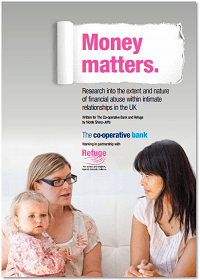Financial abuse
The extent and nature of financial abuse in the UK
The lack of financial power that many women have in their relationships leaves them vulnerable, and in Opinium’s latest research for The Co-operative Bank in partnership with Refuge the extent and nature of this problem in the UK is shown to be far-reaching. According to the research, which was conducted amongst a nationally representative sample of 4,000 people, just under a fifth (18%) of UK adults have experienced financial abuse in a relationship.Three fifths (60%) of these victims were women. Correspondingly, at least 57% of perpetrators of financial abuse are men. A series of interesting differences along gender lines were apparent throughout the findings. Female victims were much less likely to find themselves in full time work than male victims (46% vs 70% respectively) and were more likely to have a personal income of £20,000 or less (50% vs 33% of male victims).The differential experience of financial abusePinpointing where financial abuse starts also differs by gender. According to all victims, the financial abuse began either when they moved in with their partner (25%) or when they got married (15%), while 17% said it started from the outset. For male victims, this was likely to start at the outset of the relationship, while for female victims this was more likely to be at a later stage in the relationship.Women were also likely to be victims for much longer, with female victims most likely to suffer financial abuse for more than 5 years, while male victims were most likely to say they suffered for 6 months or less. Two in five (38%) female sufferers of financial abuse told no-one about it.That financial abuse is more prevalent amongst women might not be unanticipated, but evidence that the experience and reaction to financial abuse can also differ depending on gender is key to understanding this complex problem and how it effects those involved.
According to the research, which was conducted amongst a nationally representative sample of 4,000 people, just under a fifth (18%) of UK adults have experienced financial abuse in a relationship.Three fifths (60%) of these victims were women. Correspondingly, at least 57% of perpetrators of financial abuse are men. A series of interesting differences along gender lines were apparent throughout the findings. Female victims were much less likely to find themselves in full time work than male victims (46% vs 70% respectively) and were more likely to have a personal income of £20,000 or less (50% vs 33% of male victims).The differential experience of financial abusePinpointing where financial abuse starts also differs by gender. According to all victims, the financial abuse began either when they moved in with their partner (25%) or when they got married (15%), while 17% said it started from the outset. For male victims, this was likely to start at the outset of the relationship, while for female victims this was more likely to be at a later stage in the relationship.Women were also likely to be victims for much longer, with female victims most likely to suffer financial abuse for more than 5 years, while male victims were most likely to say they suffered for 6 months or less. Two in five (38%) female sufferers of financial abuse told no-one about it.That financial abuse is more prevalent amongst women might not be unanticipated, but evidence that the experience and reaction to financial abuse can also differ depending on gender is key to understanding this complex problem and how it effects those involved.
Read the Money Matters report on the extent and nature of financial abuse within intimate relationships in the UK, written for The Co-operative Bank and Refuge.





